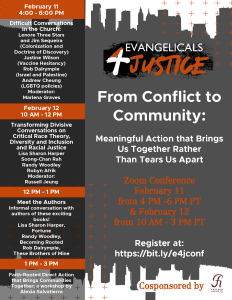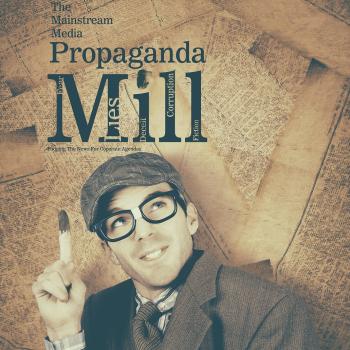
NB: apologies for those who read this blog regularly. This post is essentially the same as last week’s. Somehow it was reduplicated. A new post will be posted next Tues. User error I’m sure!
Evangelical Christianity is one of the most popular types of Christianity in the American landscape. Statistics vary as to how many American Christians identify as evangelicals but it is a significant number.
Evangelical Christianity is neither a religion nor a denomination. Instead, it is a faith movement that has grown in importance in the United States over the last five decades.
What makes an evangelical?
Most people do not realize that self-identified evangelicals reside on both sides of the political aisle. Evangelicals attend are sorts of churches: there are evangelical Lutherans and evangelical Presbyterians; there are evangelical Southern Baptist and non-denominational, mega-church evangelicals.[1]
The most widely recognized definition of “evangelical” is that of historian David Bebbington. According to Bebbington, there are four fundamental beliefs that unite all evangelicals.
- Biblicism: having a high regard for the Bible and a conviction that it contains all the spiritual truths needed for Christians.
- Cross-centered: a strong conviction of the Cross of Christ and its atoning significance for our salvation.
- Conversion: that individuals need to have a personal trust in the cross of Christ for their salvation.
- Activism: that all Christians are called to proclaim the gospel to everyone.
It is the conviction that all persons must personally believe in the Gospel that gave rise to the label “evangelical,” which comes from the Greek word “euangelion” (“good news” or “gospel”).
When did evangelicalism begin?
Evangelicalism could only have arisen after the Protestant Reformation (1500’s). This is because the exalted belief in the Bible as the sole basis for one’s beliefs and practices, which was a central pillar in the formation of Protestantism, along with the conviction that every person needs to make a personal confession of Christ in order to be saved, were distinctives of the burgeoning protestant movement that were not shared by Catholicism.[2] Once these distinctives were in place, the field was set for the formation of what became known as evangelicalism.
The rise of modern evangelicalism is largely due to the influence of Billy Graham.[3] The publication Christianity Today, which was formed by Graham in 1956, served as a media arm of the new movement. Academic institutions such as Wheaton College and Fuller Seminary served as training grounds for the new evangelicals.
If we were to ask evangelicals, and even non-evangelicals, today, “what is the defining issue of evangelicalism?” I suspect that most would respond, “abortion.”
But, did you know that abortion was not the defining issue of evangelicals in the 1960s and ’70s?[4] In fact, it was not the leading issue among evangelicals for the several years after Roe v Wade.[5] In the 1950s-70s, the evangelical movement formed around the issue of segregation[6] (see my previous post).
One of the primary battlegrounds for segregation in the 1950s and ’60s was education. Some White parents feared the prospect of their White girls attending schools with Black boys and eventually growing up, falling in love, and having “brown babies.” Thus, the response to the government’s demands to integrate the schools was the formation of private Christian schools: aka “segregation academies.” And many of those within evangelicalism supported this cause.
In the 1980s-90s evangelicalism coalesced even further around politics with the formation of the Moral Majority.
Living in the wake of evangelicalism: where have all the young people gone?
One might ask why I have written this brief introduction on evangelicalism in the midst of a series on the Church. My answer is that one must recognize the serious impact that evangelicalism has had on contemporary western Christianity.
Many Christians under 40[7] who have grown up in an evangelical church have become quite disillusioned. A good number of them are leaving evangelicalism, many are leaving the Church, and a fair number are leaving their faith.
This crisis is often not evident to older Christians who remain faithful members of their churches. They might assume that the younger folks have left to find churches that are “more relevant” for them. These older Christians often have no idea that “relevant” means to the younger generation of Christians a rejection of much of what they were taught in their youth. Nor do many of the older Christians understand that some of these younger people no longer choose to identify as Christians!

NB: I will be speaking at this zoom conference on Feb 11 & 12. Click here to register for this FREE event.
Why? Why have they left?
As much as I wish to give an answer, I would first encourage you to go ask them. The conversation might be good for them. It will certainly be good for you.
I would urge you to be prepared. And when they share with you why they left and that they believe much of what they were taught in our churches when they were younger is fraudulent, don’t be defensive. Just listen. You may want to apologize.
As far as the research on why they have left, Elizabeth Dreschers’ book, Choosing Our Religion, states it pretty plainly. She notes that young people who are leaving “tended to express anger and frustration with both the teachings and practices of their childhood church.”
Like what? You might ask. Before I provide a list of some of the teachings and practices, I should note that you’re probably not going to like the list. Also, the point is not whether we are right or not. The point is that these are some of the reasons why young people are leaving evangelicalism and in some instances why they are leaving Christianity.
To name a few:
- Politics—specifically, that many evangelicals are wed to one party and are not willing or even able to critique it fairly.
- Global warming: older people may or may not care about global warming and they may or may not believe in the overwhelming scientific evidence supporting it, but young people do. They, after all, are the ones who are planning on living on this planet for the next half-century or more and their kids may well live into the next century. Older evangelicals’ lack of concern for global warming is considered as a lack of love for the next generation who have to face the devastating effects of global warming. We will be dead, or pretty close to it.
- Immigration: for a religious ideology that expresses love for one’s enemies, young people cannot understand the fear and lack of concern for those fleeing devastation and injustice. The notion that we need to stay safe in our country and protect our citizens expresses self-interest and not a sacrificial love for the other.
- Poverty alleviation Evangelicalism’s stress on the individual has contributed to a lack of concern for poverty alleviation.
For the sake of space, allow me to list other topics that are of great significance to the younger generations.
- Women’s rights
- Abortion
- LGBTQ+
- Justification of war; militarism
- Racism
- Nationalism
- White nationalism
- Narrow-mindedness; judgmentalism
- Zionism and Islamaphobia
- Gun violence
- Anti-science: anti-evolution
There are certainly more items on the list, but I hope you get the point.
What is far worse than evangelical views on these issues is the lack of love evangelicals have shown to those who disagree. You may or may not like some or all of these issues, but we are still called to love those who do.
“By this all men will know that you are My disciples, if you have love for one another” (John 13:35).
The next generation looks at statements like this and concludes that many evangelicals must not be disciples of Jesus.
To receive auto-updates when new posts go live sign up for the newsletter on the top right-hand side of the homepage.
NB: My goal is to keep these posts free of charge. I do not intend to ever hide them behind a paywall. I can only do this if those of you who have been blessed by them and can afford to give ($5, $10, $25, or more/month) do so. You can give a tax-deductible contribution by following this link.
Please share this post and let others know about determinetruth.
If you wish to view this blog on your smartphone through the Determinetruth app simply download the “tithe.ly church” app on your smartphone and insert “determinetruth” as the church name you wish to follow. Once it is loaded, simply click on the “blog” icon and they will automatically load.
If you would like to have Rob speak at your church or organization in person or via zoom, please let us know by filling out the contact info on the Contact me tab on this site.
[1] There is a chart of 40 “evangelical” churches and their interrelationships available on the National Assocation of Evangelicals website https://v2ieg1eiji227cna43m44rey-wpengine.netdna-ssl.com/wp-content/uploads/2022/01/NAE-Denominational-Network-Diagram.pdf. There are “evangelical” churches that are not included in this chart, but nonetheless it gives a good representation of the diversity and distinctives of evangelicalism.
[2] This is not to say that Catholics do not or cannot believe in such. It is simply to state that such beliefs were not a distinctive part of Catholicism and were not widely held.
[3] I am not interested in presenting a thorough history of evangelicalism. Many claim that it formally arose in the early 1900’s after some began to break from the Fundamentalist movement.
[4] See: Daniel Williams, Defenders of the Unborn, Oxford University Press; Reprint Edition (December 4, 2015).
https://www.thegospelcoalition.org/blogs/evangelical-history/christian-right-discovered-abortion-rights-transformed-culture-wars/. Last accessed 9-7-20.
[5] Abortion did not become the defining issue for American evangelicals until 1980. Prior to the 1980’s abortion was viewed by many evangelicals as a “Catholic” issue. Because evangelicals were often anti-Catholic, this meant that most evangelicals prior to 1980 were pro-abortion.
[6] See https://www.bostonglobe.com/opinion/2018/02/05/race-not-abortion-was-founding-issue-religious-right/A5rnmClvuAU7EaThaNLAnK/story.html. Last accessed 9-7-20. https://www.politico.com/magazine/story/2014/05/religious-right-real-origins-107133. Last accessed 9-7-20.
[7] Certainly, there are a number who are over 40 as well.












